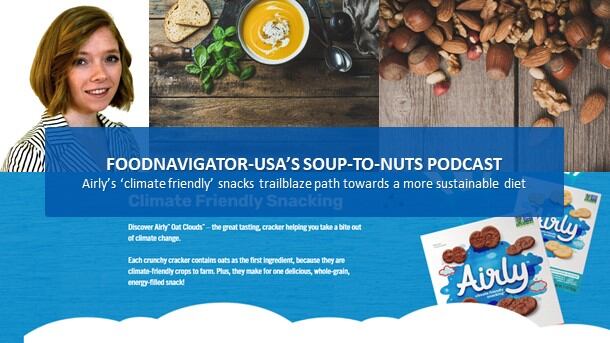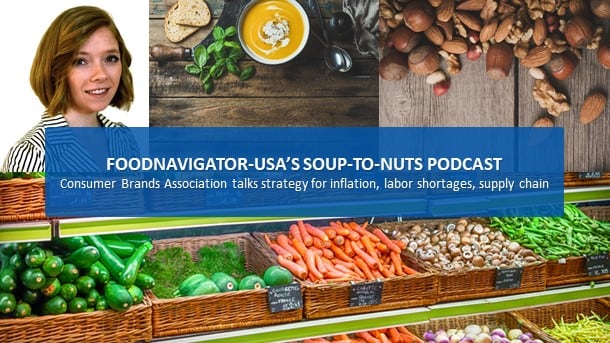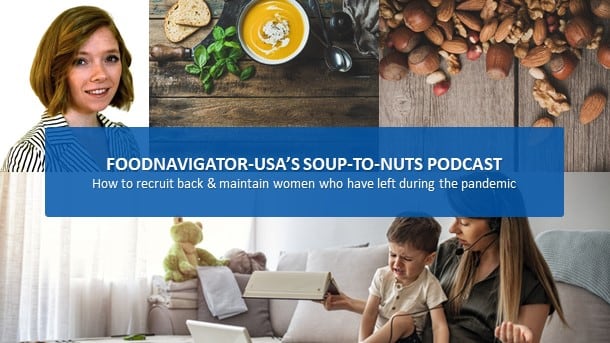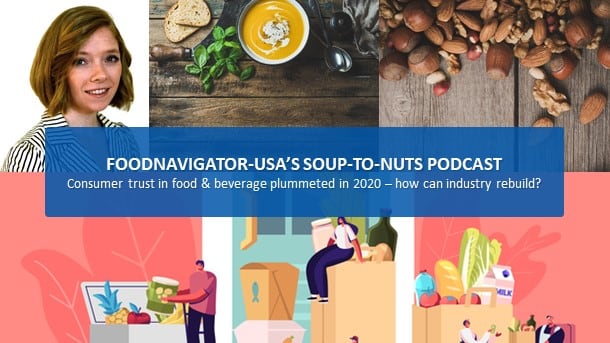IFIC’s 16th annually Food & Health survey of more than 1,000 US adults conducted in March found 42% of respondents believe their individual food and beverage choices have a significant or moderate impact on the environment, but currently only 31% ranked environmental sustainability as an important factor in their food choice – far lower than other priorities.
But even though environmental sustainability came in after convenience, healthfulness, price and taste as a top food and beverage purchase driver, IFIC also found that 53% agree that if it was easier to understand the actual environmental impact of their food choices, it would have a greater influence on the choices they make.
In this episode of FoodNavigator-USA’s Soup-To-Nuts podcast, we look at how the barley ingredient supplier EverGrain and Post Holdings’ subsidiary Bright Future Foods are talking with consumers about the environmental impact of their recently launched Airly Oat Cloud Crackers, which they bill as the first ‘climate friendly’ snack. The co-founders of Airly Foods also share the steps they are taking to reduce their carbon footprint at each point in the supply chains and how they are using carbon credits to offset emissions they can’t yet eliminate.
[Editor’s Note: Never miss another episode of FoodNavigator-USA’s Soup-To-Nuts podcast – subscribe today.]
Creating climate friendly foods – basics about the company and crackers
The inspiration for Airly Foods was born out of a sense of urgency to address climate change in a way that didn’t just slow the inevitable, but could help reverse it without feeling like a sacrifice so that others would want to follow suit.
To do this, Airly’s Chief Marketing Officer Jennifer McKnight said the company took a hard look at the top greenhouse gas emitters and asked if the source of the problem, could also be the solution.
“Twenty-five to 30% plus, depending on which study you look at, of the greenhouse gasses that are out there result from the global food supply chain network. So for us, that was really an important impetus, and we started with a question of ‘what if’ – you know, what if instead of just trying to be ‘less bad’ we could actually harness the power of food to help fight climate change? So, that really became our mission at Airly,” she explained.
Building on this premise, Airly established four core values for its business and approach to food production, McKnight said.
“First and foremost, was ‘the time is now,’” she said, explaining that the company decided to do the best it could now, even though that might be imperfect, and continue to improve as time progresses.
The second core value is to make products that are accessible – meaning both affordable and widely available – so that consumers could participate in reversing climate change by snacking on Airly crackers. The third and fourth are continual improvement and respect for nature.
Oats are the secret ingredient to Airly’s success
From this framework, came Airly’s first products – a line of sweet and savory oat-based crackers that the company’s Chief Science Officer and Co-founder Mark Izzo explained are crave-able, accessible and make it easy for everyone to reduce their carbon footprint.
He added Airly opted for crackers because there is a high consumer demand for them, which means the potential for significant impact, and because as a shelf stable, light weight, minimally processed food they have a much smaller footprint naturally compared to frozen food or fresh perishable products that must be kept cool, shipped fast and can be heavy.
Beyond that, Izzo explains the biggest factor in Airly’s ability to reduce its carbon footprint is its uniquely farmed oat-base, which was cultivated in partnership with climate and soil scientists to develop best growing practices to sequester more carbon than is expelled during production. These practices include using crop rotation, forgoing tilling and “very careful precision management,” he explained.
Last year’s oat crop used by the company to create its current crackers set a high bar for carbon sequestration, which the brand proudly touts on the back of each 7.5 ounce box of crackers as 18 to 21 grams of Co2 removed from the air depending on the flavor. The company playfully, and helpfully, adds this is equal to about 2,500 to 2,900 beach balls worth of fresher air.
While these levels of sequestration are a “big achievement,” company Co-founder and Chief Supply Chain Officer Kris Corbin notes Airly already is on track to surpass these levels next year through its efforts with farmers, millers and other stakeholders up and down the supply chain.
But, he added, “the farms are not the only area that we’re focused on. We also have key ingredient vendors that provide our seasoning and flavors that go into the crackers, as well as packaging material and we’re working closely with those vendors to eliminate and reduce the carbon footprint for those particular inputs.”
In the beginning, not everyone believed Airly could meet its ambitious goal and some vendors bowed out rather than amend their methods, Corbin said. But after Airly proved the process could succeed, he said companies and potential partners are eager to work with the company and help reduce their climate footprints.
Carbon offsets are a bridge forward, but not a long-term solution
Despite the care Airly is taking to minimize its carbon footprint and make its products as carbon neutral or negative as possible, there are points in the supply chain and manufacturing process that still generate greenhouse gasses – and for these cases, the company is purchasing carbon credits to offset its impact.
McKnight explains the company’s decision to invest in carbon credits wasn’t taken lightly and isn’t a get out of jail free card for minimizing carbon emissions going forward.
“It’s our goal to make the product itself as carbon neutral or negative as possible,” but realistically today there is no way to completely eliminate all emissions from the baking process and transportation, which is where offsets come into play, McKnight explained.
She added that Airly selects offsets that support agriculture and forestry projects that further sequester carbon.
McKnight notes that the company also isn’t trying to hide from consumers that it buys carbon credits to offset currently unavoidable greenhouse gasses. Rather, she explains, that the company is fully transparent in its marketing about the challenges and successes of creating a “climate friendly” snack, which in and of itself is not an easy undertaking.
It does this by spelling out its goals, values and accomplishments on the back of every cracker box – using terms that consumer’s will understand – such as equating the amount of carbon sequestered to beach balls filled with fresher air.
Airly is not the only company talking about its carbon footprint on pack, but other efforts so far have focused on the numbers, which can be difficult for consumers to understand. And those efforts have been limited – which McKnight says Airly hopes to change.
Izzo echoed this sentiment, noting that many companies have made ambitious goals to be carbon neutral or negative in the next five to 15 years, and Airly hopes to help lead and evolve with this transformation.
“Our mission is to reverse climate change through food. The product was created to do that and to show it can be done. And what we’ve done … empowers the consumer to determine the rate at which our food supply can change,” Izzo said. “It’s in their hands now and we’re going to do everything we can to keep educating, pushing and being disciples for this new way of eating.”
As Airly helps push that conversation forward, it also will continue to push innovation with new products – including plans for wheat-based snacks – rolling out in the future.




